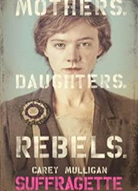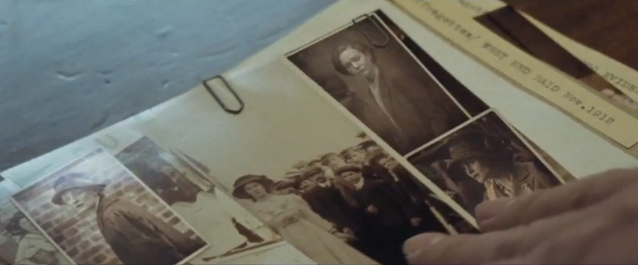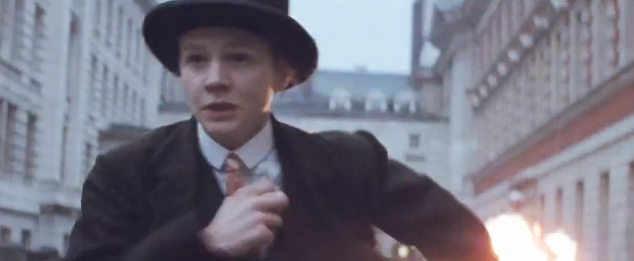"Suffragette" Shoulders into the Oscar Fray
 Monday, November 2, 2015 at 10:45AM
Monday, November 2, 2015 at 10:45AM  Is “Suffragette” faltering under the weight of overly high expectations? With its impressive pedigree and unimpeachable subject matter, Sarah Gavron’s historical drama about the militant wing of the British suffragist movement seemed poised to be a strong Oscar contender for this fall. Now, as we move towards the holidays, its status is looking uncertain: reviews have been mixed, and it’s drawn criticism for everything from its limited narrative focus to the limited screen time of Meryl Streep, who receives top of the line billing for a role that’s essentially no more than a cameo.
Is “Suffragette” faltering under the weight of overly high expectations? With its impressive pedigree and unimpeachable subject matter, Sarah Gavron’s historical drama about the militant wing of the British suffragist movement seemed poised to be a strong Oscar contender for this fall. Now, as we move towards the holidays, its status is looking uncertain: reviews have been mixed, and it’s drawn criticism for everything from its limited narrative focus to the limited screen time of Meryl Streep, who receives top of the line billing for a role that’s essentially no more than a cameo.
If there’s a common trend to the criticism, it’s that the critics seem mostly preoccupied with what the movie doesn't do rather than what it does. “Suffragette” is less a historical chronicle of the suffragettes than a snapshot view through the eyes of one (fictional) working class woman who’s accidentally and at first reluctantly drafted into their ranks. It’s a study of what circumstances would drive such a woman to join a movement that would seem to hold no immediate benefit or attraction for someone in her position. [more...]
As such, it’s effective and hits all its emotional marks, even if it doesn’t quite transcend the sum of its parts.
Much of what works about the film hinges on the linchpin performance of Carey Mulligan. Like a lot of Mulligan’s signature roles, it’s not a showy turn but the kind that creeps up on you, as her character, Maud Watts, gradually emerges from her quiet, compliant shell and wakes up to the dual recognition of her own strength and the profound injustice of her disenfranchisement—not just in the area of voting, but in every aspect of her life. The script, written by Abi Morgan (Iron Lady, Shame, and one of the best and most underappreciated TV series ever, “The Hour”), steers Maud towards her eventual epiphany in a way that never feels forced, even if it comes close to overplaying its hand in one wrenching scene involving her young son and a husband (Ben Whishaw, playing against type) whose cruelty is driven by weakness rather than malice.
The movie’s also remarkably balanced and unsentimental in its depiction of the dark side of the suffragette movement. It shows in sharp detail the harsh treatment the suffragettes suffered for their lawbreaking, from police beatdowns to force feedings to end their hunger strikes while in prison. At the same time, it also doesn’t shy away from casting seeds of doubt on the wisdom of the suffragettes’ more extreme, proto-IRA-style tactics—or their material impact on women like Maud, who could ill afford to be on the wrong side of law and society. Some of the film’s most interesting interactions are between Maud and the Special Branch detective, nicely underplayed by Brendan Gleeson, who’s gathering intelligence on the suffragettes and who tries to convince Maud that the movement is no friend to women of her class. Of course he doesn’t persuade her or us, yet he is persuasive as the reasonable man tasked with enforcing an unreasonable law. On the other side, Helena Bonham-Carter, Anne-Marie Duff, and Romola Garai present three different faces to the suffragette movement, more thinly sketched than Maud’s but still believable, each with different backgrounds and motivations leading to the same overarching goal.

Some viewers may find it odd that the movie ends several years before the suffragists even began to see that goal enacted in law. It’s not actually all that arbitrary a stopping point, as the final historical event shown – the 1913 Epsom Derby – did mark a watershed moment for the movement. (It’s a gripping scene, incidentally – even if you know how it ends, it’s still breathlessly tense right up to the finish.) And again, the movie isn’t trying to show the triumphal achievement of women’s suffrage; it’s showing the journey to the self-realization of Maud Watts, which takes place over the course of a particularly important year in the suffragette movement. Her arc is complete, even if that of her cause is not.
Suffragette isn’t a perfect film. It’s faulted, not unjustly, for being too white, too stodgy, too obvious in its messaging. Still, I submit it’s no more any of these things than another recently released and more widely praised historical drama, Spielberg’s Bridge of Spies. True, the latter displays superior (shall we say Spielbergian) cinematic craft and a finesse, even a touch of slyness at times, that Suffragette lacks. But I can’t help wondering if that’s the only reason Bridge of Spies has been getting better reviews. Could it be that we’re more willing to be generous to Spielberg, the Coen brothers, and Tom Hanks (who, don’t get me wrong, is terrific in Spies) for fashioning an entertaining, male-focused tale of a recognizably American, take-charge hero than we are to a lesser known British female director and writer for focusing on an oppressed woman who takes the entire film to assert full agency over her own life?
Grade: B
Oscar Potential: ???




Reader Comments (9)
Thank you so much for this thoughtful review!
I am afraid that there is indeed a positive bias towards Spielberg&Co.
I think it is very premature to judge the success of the box office returns of "Suffragette" because it hasn't been released wide in North America yet. Let's be scientific about this, the only place where "Suffragette" has had a wider release is in the UK.
I invite you to read The Guardian analysis, because it shows that "Suffragette" has done well with a different strategy of debuting on a Monday. Basically the film has taken in 11 million so far and has been No. 2 (with extra days, would have been #4 w/o the extra days), and the second week held at #4 position. This film is performing well for female and older audiences, and it's share diminished by only 13% from it's first to second week.
Here are the links:
http://www.theguardian.com/film/2015/oct/20/uk-box-office-hotel-transylvania-2-suffragette-pan
http://www.theguardian.com/film/2015/oct/27/hotel-transylvania-2-uk-box-office-spectre-suffragette
Focus Films hasn't released "Suffragette" widely yet in the US/Canadian market which is annoying to those who want to see it.
As for the critical reception/expectations being different for "Suffragette" vs. "Bridge of Spies" - I cannot answer for the predominantly male critical establishment...
What is clear is that the strategy for the films release is working in the UK, "Suffragette" has done better than "Far from the Madding Crowd", and it has found an audience.
Lovely piece that really captures much of what I liked about the film. I hate how dismissive responses have been.
about this
i liked the film but i think this type of problem -- so common with historical dramas -- is excused IF and only if critics are feeling generous toward the film. I'm not sure why women's stories have such a hard time with critics. I don't think it's solely that the critical field is so male-heavy. I think the problem runs much deeper to systemic bone-deep sexism. For example i've noticed online that girls who like typically male things are proud of it like 'gross romantic comedies!' as if not being stereotypically girly is a huge point of pride. But men who are not stereotypically manly rarely champion it.anyway... the other problem is that it might be a little more ambitious than it can achieve. everything happens so quickly that sometimes it feels character arcs are happening because the plot has demanded that they do right then rather than to feel organic. It feels overstuffed and thin at the same time i guess i'm saying.
but i liked the film. it's just not as good as i was hoping.
smart comparison with Spies, of the two Suffragette was the one I enjoyed more.
Nathaniel - I see what you're saying about being both overstuffed and thin, though for me I think it (mostly) successfully walked a line between trying to be focused on this one person's story while still reflecting the larger, historical story. But it's a hard balance for any film to strike, and this one did sometimes succumb to the need to check off certain boxes, if you will. Still, I liked it more than I expected to, maybe in reaction to the mixed reviews.
Also for the record, I do think "Bridge of Spies" is the better of the two movies. But not by that much.
"Meryl Streep, who receives top of the line billing"...
WHERE? I just saw the movie and Streep is the 5th or 6th billed. And, the posters? Her name isn't even on most of them. The posters and ads all focus on Carey Mulligan.
Joe S -- hmmm. not sure what you mean. Meryl Streep got her own character poster and she's one of only three people on one of the main posters.
Certainly, not all the posters. She's not even IN some of them. And, Streep certainly was never "top billed" in any advertising or the movie itself.